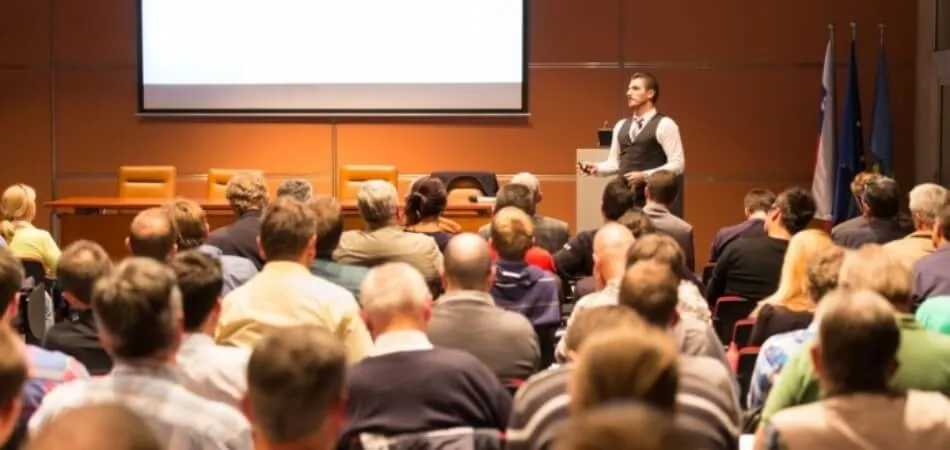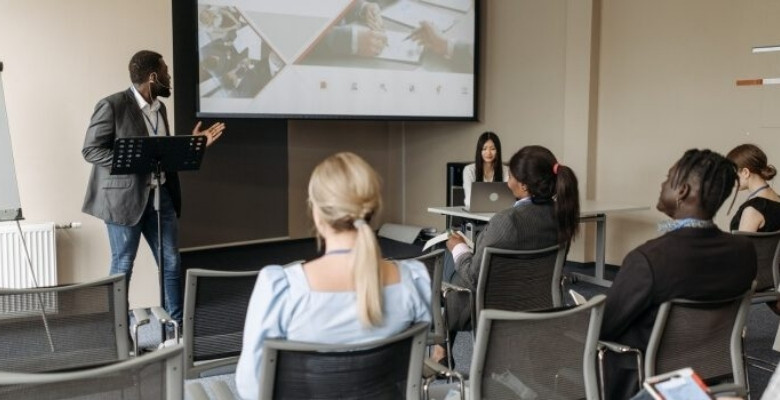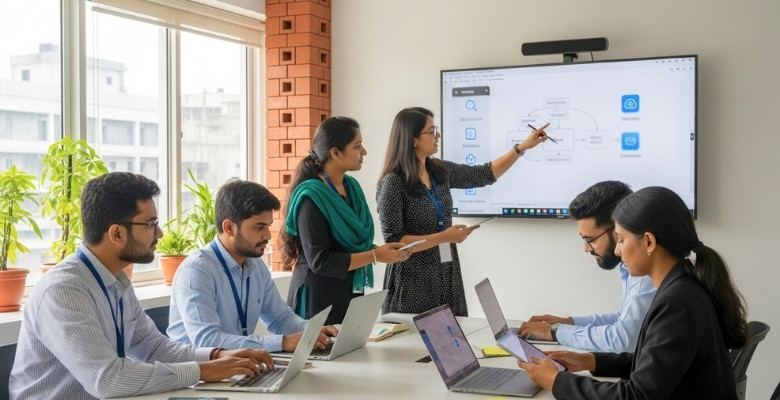New ideas often come home with you after a conference, but their true value depends on how well you share them. Insight that stays in your notebook helps only you; insight that’s shared can inspire a whole team. The difference lies in making the information practical and easy to act on. The big question is how to share what you learned at a conference in a way that matters.
The best way to share what you learned at a conference is to turn your notes into clear, actionable takeaways. Summarize the most relevant points for your team, create short slides or a recap email, and highlight ideas that match ongoing projects. Instead of copying everything you heard, focus on 3–5 insights that can directly benefit your colleagues.
When framed this way, your takeaways become more than information; they turn into a roadmap for improvement. This guide gives you a step-by-step process to make that happen. You’ll find a simple plan, communication tips, and ready-to-use templates that save time.
How to Share What You Learned at a Conference?
Going to a conference is always exciting as you meet people, hear fresh ideas, and walk away with plenty of notes. But once you’re back at work, the real challenge begins: how do you share those insights in a way that your team actually uses them? A long email nobody reads won’t help, and neither will dumping slides into a shared folder. What works is a simple plan that balances clarity with action. Here’s a five-step approach you can try.

Step 1: Capture Your Top Five Insights
Conferences are full of information, but people don’t have time to digest everything. Narrow it down to the five most important takeaways. For each, ask yourself three quick questions: What is the insight? Why does it matter? Where can it be applied? This keeps your sharing sharp and practical, much like highlighting the main takeaways from a meeting so the team can act quickly.
Step 2: Pick the Right Audience and Channel
Not everyone needs the same detail. Your leadership team wants the big picture on a single page. Your immediate team needs a short debrief with actions. The wider organization is fine with a few quick lines in Slack or Teams. Matching the message to the audience saves time and ensures people stay engaged.
Sample Templates You Can Use:
Team Email
Subject: 5 Takeaways from [Event Name] + Next Steps (25-min debrief)
Body:
Hi Team,
I’ve gathered five key insights from [Event Name] that can help us improve [specific area]. Let’s run a short 25-minute debrief on [date/time] to discuss applications.
Docs and action notes here: [link]
Note: We’ll have a discussion on these in detail in the included part of the article.
Step 3: Run a Short Debrief
A 30-minute session is enough to turn notes into next steps. Share your five takeaways, give a quick example or demo, then invite discussion. Don’t worry about fancy slides; six is usually enough. The key is to move from “here’s what I learned” to “here’s how we can use it.”
Step 4: Assign Owners and Dates
Ideas die when nobody owns them. Before ending the debrief, lock in at least three clear actions, assign who’s responsible, and agree on deadlines.
Simple Action Tracker Example:
| Action Item | Owner | Deadline |
| Test AI-driven personalization in an email campaign | Alex | Sept 15 |
Even a single row like this shared in Slack keeps accountability clear.
Step 5: Publish and Track Progress
Finally, wrap everything into a one-pager and share it across your channels. But don’t stop there, check back at 30, 60, and 90 days. Are the quick wins happening? Are pilots underway? Is there any measurable impact? Tracking progress proves the conference wasn’t just a nice trip, but something that created real value. Sharing even a short conference summary example makes it easier for others to see progress and apply what you’ve learned.
This system also makes it easier to prepare for future events. For example, if you already know you’ll be attending upcoming conferences in Canada or anywhere else, you can plan ahead by setting up how you’ll capture insights, how you’ll share them, and how you’ll track progress afterward. That way, the learning doesn’t just stay on paper; it turns into action.
Why Sharing Your Conference Learning Matters?
Attending a conference is great, but the real difference comes when you bring those ideas back and share them. Sharing is not just about reporting notes; it’s about creating value for others. Here’s why it makes such a big impact.
Builds a Learning Culture
When you share your conference insights, you show your team that learning doesn’t stop at the conference. It sets an example that ideas are worth spreading. Even one short insight can spark a new way of working that benefits everyone.
Turns Insights Into Actions
Insights are only helpful when they lead to action. By sharing them clearly, you give your team the chance to turn those notes into real tasks. Adding names and deadlines ensures the learning becomes something visible and measurable.
Boosts Visibility and Results
Sharing also highlights your role as someone who brings back value. Instead of knowledge staying with you, your team gets to benefit too. This not only shows leadership on your part but also helps your team achieve stronger results.
Saves Time for Everyone
Your colleagues don’t need to go through hours of slides or recordings. A short summary gives them the best parts of the event in just a few minutes. This makes your sharing more practical and easier to act on.
Keeps knowledge From Being Lost
Conference notes often sit in a notebook or folder and never see the light of day. Sharing them ensures the key points are captured, remembered, and used when the team needs them most. It also plays an important role in evaluating a conference’s value because the shared outcomes show whether the event was worth the time and effort.
Sharing what you learned is not about more slides or long reports. It’s about creating quick wins for your team and making the overall conference experience useful for everyone. Keep reading to see how you can put this into practice.
The One-Page Report for Sharing Conference Insights
One of the easiest ways to make your conference learning useful is to turn it into a simple one-page report. This isn’t about writing long documents; it’s about giving your team the highlights they can act on quickly. Think of it as a short conference summary that captures only what matters most. Here’s what to include.
Event
Start with the basics: the name of the conference, the dates, and where it was held. This gives context so anyone reading knows exactly which event you’re reporting on.
Objectives
Explain why you attended. Was it to learn about new tools, connect with industry peers, or bring back best practices? A short note here helps readers understand the purpose behind your participation.
Top Insights with Session Details
Highlight the five most valuable points you took away. For each insight, note the session or speaker it came from. This not only adds credibility but also makes it easier for others to follow up if they want more depth.
Actions, Owners, and Dates
Insights are only useful if they lead to next steps. List the actions your team should take, who will be responsible, and the deadlines. Even a short list of three actions shows how learning is moving into action.
90-Day Metrics
Add a quick plan for checking progress at 30, 60, and 90 days. It could be as simple as tracking whether tasks are started, pilots are underway, or early results are showing. This keeps accountability clear.
Resources
Finally, attach or link to any slides, articles, or recordings you collected. Having resources in one place makes it easy for your team to go deeper without asking you for files later. You can even turn this report into a quick knowledge-sharing presentation so your team can see the highlights in a more interactive format.
One-page Report Template
Here’s a simple format you can copy or download:
Conference Name: ____________________________
Date & Location: ____________________________
Objectives:
– __________________________________________
– __________________________________________
Top 5 Insights:
- [Insight] – from [Session/Speaker]
- [Insight] – from [Session/Speaker]
- [Insight] – from [Session/Speaker]
- [Insight] – from [Session/Speaker]
- [Insight] – from [Session/Speaker]
Actions, Owners, and Dates:
| Action Item | Owner | Deadline |
|————-|——-|———-|
| Example: Test AI-driven personalization | Alex | Sept 15 |
90-Day Metrics:
– 30 Days: _________________________________
– 60 Days: _________________________________
– 90 Days: _________________________________
Resources:
[Attach slides, articles, and recordings]
Download this Sample Instantly
Academic/Research-style Conference Report (IEEE-like)
Sometimes a one-page report isn’t enough, especially if you’re working in academia or research. In those cases, your report needs to look more structured and formal so others can reference it later. Here’s how an academic-style report can be useful.
When to Use
An academic or IEEE-style report works best when you are writing for a professional, research, or academic audience. This format is often needed when your insights may be cited, included in institutional records, or shared with professors and researchers. It also helps when you want to show detailed analysis, methods, or references that go beyond a quick summary.
Preview Image
(Insert preview image of sample academic-style layout here, showing structured sections like abstract, objectives, methods, findings, and references.)
Academic Report Template
Here’s a simple structure you can adapt to create a professional, IEEE-like conference report:
Click here to view the template
An academic-style report is more detailed than a one-pager, but it ensures your insights are recorded formally and can be reused in professional or research settings. Use this when you need depth, structure, and references, not just highlights.
Communication Templates (Email, Slack/Teams, LinkedIn)
Different channels serve different purposes when it comes to sharing conference insights. The goal is to make sure your message is clear, quick, and adapted to the audience. Here’s why and how to use each one effectively. Effective sharing of learnings this way ensures your message doesn’t get lost and reaches the right people in the right format.
Team Email (Post-Event, Action-Oriented)
An email is best when you need your team’s full attention and want to set up a short discussion. It helps you share insights in detail and ensure the team knows when and how to act on them.
Sample Template:
Subject: 5 Takeaways from [Event] + Proposed Actions (25-min Debrief)
Hi Team,
I’ve gathered five key insights from [Event Name] that can help us improve [specific area]. Let’s run a short 25-minute debrief on [date/time] to discuss how we can apply them.
Docs and action notes here: [link]Slack/Teams Post (Short + Links)
Use Slack or Teams when you want to share quick updates that spark attention. It’s perfect for short summaries that people can scan in seconds, along with a direct link to notes or a scheduled debrief.
Sample Template:
“3 things we can use now from [Event]:
• [Insight 1]
• [Insight 2]
• [Insight 3]
Debrief: [date/time] | Docs: [link]”
LinkedIn Post (Personal Brand)
LinkedIn works well if you want to share beyond your team and build your professional reputation. A short list of takeaways shows value, and inviting comments helps you connect with peers who may want the full summary.
Sample Template:
“Back from [Event] with 3 takeaways worth sharing:
- [Insight 1]
- [Insight 2]
- [Insight 3]
If you’d like the full one-pager with details, comment ‘summary’ and I’ll share it with you.”
Using the right template saves time and makes your insights more effective. Share by email for team focus, use Slack/Teams for quick updates, and post on LinkedIn to extend value beyond your workplace, each one playing a role in sharing learnings effectively.
Tools & Workflows to Capture + Store Learnings
Taking notes during a conference is important, but keeping them organized afterward matters even more. Following the best practices for taking notes at conferences helps you capture clear insights in the moment, and a simple system keeps them easy to find and share later. Let’s break it down.
Set One Home (Notion/Confluence/Drive)
Instead of spreading notes across different apps, pick one main place where all post-conference files live. It could be Notion, Confluence, or Google Drive. What matters is consistency. When everyone knows where to look, your insights become easier to access and reuse.
Use a Simple Path
Create a clear folder path like /YYYY-MM-Event/. For example, if you attended an event in August 2025, your folder might look like /2025-08-GCA/. This makes it simple to sort events by date and quickly pull up past reports when needed.
Name Files Clearly
Avoid random file names like “notes_final2.docx.” Instead, use a naming style such as 2025-08-GCA-OnePage.pdf. A consistent format makes it obvious what each file is about, when it was created, and which event it belongs to.
Keep a Shared Index
Build a single index or list of links and contacts. This can be a simple table with file names, links, and speaker details. Having one index saves time and ensures your team knows exactly where to find each resource.
Record Quick Briefs
Sometimes your team doesn’t have time to read everything. Recording a short 3–5 minute Loom video can work better. Share the highlights on video, then paste the link to your one-pager below it. This way, people get both quick context and written notes.
Capturing insights is only half the work; storing them in a simple, reliable system ensures they remain useful. Whether it’s a shared folder, a clear index, or a short video, choose the workflow that helps your team act on the learnings.
Common Difficulties You Might Face While Sharing Your Knowledge
Sharing what you learned after a conference isn’t always easy. Sometimes people are too busy, and other times your notes don’t land the way you hoped. The good news is that most challenges have simple fixes. Let’s look at some common ones and how to handle them.
Too Much Info, Too Little Time
It’s tempting to share everything, but long reports usually go unread. Limit yourself to five key takeaways and package them in a one-pager. Aim to share it within 48 hours while the ideas are still fresh.
Use: One-Page Report
Low Engagement
Sometimes people don’t pay much attention to shared notes. A short 30-minute debrief works better. Treat it as a knowledge-sharing meeting where people can ask questions and give input. Keep the slides to six at most, and ask two simple questions to spark discussion. This makes the session more interactive and engaging.
Use: Debrief Agenda + 6-Slide Outline
No Follow-Through
Even good ideas lose impact if nobody acts on them. Assign owners and dates during your debrief, not afterward. Post the action list in Slack or Teams so everyone can see and track progress.
Use: Team Email + Slack/Teams Template
Jargon Across Departments
Not everyone speaks the same technical language. Instead of buzzwords, translate your insights into plain outcomes like “time saved” or “fewer steps.” This makes your message clear across different teams.
Use: One-Page “Why it matters” phrasing
Sensitive Info
Sometimes you can’t share everything. Create a shorter public summary and keep the full notes in a restricted folder. This way, the right people have full access without risking sensitive details.
Use: One-Page + Folder Permissions Workflow
Hard to Prove Value
If people ask, “What did we gain from this conference?” you need proof. Track adoption at 30, 60, and 90 days, and add one simple business metric, like reduced cycle time or faster response rates. Even a simple way to share conference outcomes with leadership can highlight the value gained.
Use: 30/60/90 Plan
Sharing conference learnings can have challenges, but each one has a clear and practical solution. Focus on keeping things short, clear, and actionable, and you’ll find your insights have a much bigger impact.
Tips for Storing Knowledge You Learned at a Conference
Learning at a conference is one thing, but making sure that knowledge is organized and available later is just as important. Without a clear system, notes often get lost. Here are some simple ways to keep everything in one place and easy to use.
- Create one “Post-Conference” Space: Don’t spread your notes across random folders or apps. Choose one central space, like a dedicated folder or workspace, so all your reports, slides, and summaries stay together.
- Summarize Daily in 5 Bullets: Instead of waiting until the end, jot down five key points after each day. These short notes will save you time when you’re putting together your one-pager later.
- Attach Slides and Links With Speaker Details: Keep slides, links, and resources attached to your notes, and mention which session or speaker they came from. This makes it easier to trace ideas back when your team needs more context.
- Record Short Loom Videos: A quick 3-5-minute Loom video often works better than a 30-minute recording. People can catch up fast, and you can link the video directly under your one-pager for easy access.
- Tag With Up to Three Labels: Add simple tags like topic, team, or project. This helps you and your team search and filter insights quickly without digging through long lists of files.
- Book Short Reviews at +14, +30, and +60 Days: Schedule quick 15-minute check-ins after two weeks, one month, and two months. These mini-reviews keep the actions moving and ensure the insights don’t fade away.
Good storage is what keeps your conference learnings alive. A little structure saves time, avoids confusion, and makes sure your team can benefit from your notes long after the event is over.
FAQs: Sharing Conference Learnings
Sharing what you learned often raises more questions than answers. Many people wonder how much to share, when to share it, and how to make sure others actually use it. Here are some common questions and clear answers to guide you.
How Soon Should I Share My Conference Notes?
It’s best to share your notes within 48 hours while the ideas are still fresh. Quick sharing helps keep momentum and ensures your team can act right away. Waiting too long risks losing interest and context.
Should I Share Everything or Only Key Points?
You don’t need to share everything; focus on the insights that matter most to your team. A short, clear summary is easier for people to read and use. Prioritizing saves time and avoids information overload.
Can I Share Learnings With People Outside My Organization?
Yes, but share carefully depending on the content. General insights or trends are fine for LinkedIn or industry peers, but sensitive details should remain internal. Always consider what’s safe and useful to publish publicly.
What If My Team Doesn’t Have Time to Read Reports?
Keep your updates short and easy to skim. A one-pager, a quick Slack post, or even a short video can do the trick. People are more likely to engage when it’s simple.
How Do I Make My Sharing More Engaging?
Add examples, highlight quick wins, or link to resources that people can use right away. Interactive debriefs also work better than just sending notes. Engagement comes when people see real value in your takeaways.
Can I Turn My Learning Into Training Material?
Absolutely, your conference notes can become slides, workshops, or quick guides for your team. This helps spread knowledge beyond one meeting. Turning insights into training also shows you’re investing in long-term improvement.
What’s the Best Way to Track If Learnings Were Applied?
Use simple check-ins at 30, 60, and 90 days. This helps you see if actions have started, are ongoing, or have delivered results. Tracking proves the value of attending the conference.
Concluding Lines
Sharing what you learned after a conference works best when it feels simple and clear. Instead of overloading people with too much detail, focus on the points that matter most to your team.
When you understand how to share what you learned at a conference, you make your takeaways more practical. This helps transform notes into actions that can improve teamwork and even inspire new ideas across your organization.
The real goal is not just remembering the event but making it useful for others. By sharing highlights, linking them to real tasks, and keeping things easy to follow, you bring lasting value back from the conference.










